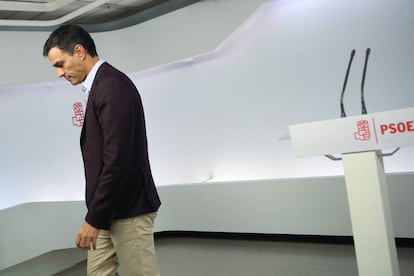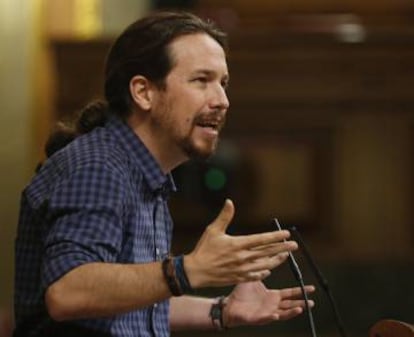Leaderless Socialists split on how to break Spain’s political deadlock
Pedro Sánchez’s resignation leaves main opposition deeply divided on best way to avoid third election

Socialist Party (PSOE) leader Pedro Sánchez’s decision to resign following an internal revolt has not yet cleared up the issue that is tearing the party apart: will it allow acting PM Mariano Rajoy to form a government and break Spain’s prolonged political stalemate?
The interim management team that has taken over from Sánchez will convene a session of the Federal Committee within three weeks to try to decide on a strategy. On Saturday, this same committee held an emergency meeting at party headquarters in Madrid, where it voted down Sánchez’s proposal for primaries and an express party congress later this year to put his leadership to the test.
The PP has done nothing to deserve the PSOE’s trust
Ximo Puig, Valencia premier
Faced with overwhelming opposition, Sánchez decided to step aside, effectively leaving Spain’s main opposition party without a clear leader. And with the political clock ticking, the management team must now attempt to bring some unity back to the party while figuring out a way to avoid a third general election in December.
No means no
The chairman of the interim team, Javier Fernández, is aware that Sánchez’s supporters will still refuse to help Rajoy, of the conservative Popular Party (PP), back into office. Sánchez’s unwavering “no is no” throughout the last nine months has prevented the PP, which won the most votes in two consecutive elections but fell short of a majority, from securing the necessary seats to put together a new government.
The PSOE could passively help Rajoy by abstaining at an investiture vote to choose the next PM. Felipe González, Spain’s longest-serving prime minister and a respected figure in Spanish socialism, has twice come out in public to say that the party should not block a PP government for the sake of the country.

But it is unclear whether Sánchez’s resignation will change the party line. On Sunday, two major party figures said that the PSOE should not help the PP in any way. The leader of the Catalan Socialists, Miquel Iceta, said he supports “a resounding no” to a Rajoy government. And Ximo Puig, premier of the Valencia region, said that “the PP has done nothing to deserve the PSOE’s trust. We can neither enter a coalition government nor help them into power.”
Podemos reaffirms position
In the meantime, other parties already have their own take on the weekend’s events. The anti-austerity Podemos, which has been the Socialists’ chief competitor for leftist votes, said that now more than ever, it is the only real alternative to the PP conservatives.
“Supporters of handing the government to the PP are imposing their views within the PSOE. We will continue [to work] with and for the people in the face of this government of corruption,” wrote Podemos leader Pablo Iglesias on Twitter.
Ciudadanos, Spain’s other emerging party, urged the PSOE to negotiate with the PP and insisted that “there is still time for a minority government” before the political calendar forces King Felipe VI to dissolve parliament and call new elections.
The PP is adopting a “wait-and-see” attitude, without assuming that the new PSOE leadership will necessarily be more open to negotiations than Sánchez was.
“It’s a delicate situation,” said a top Rajoy aide. “Podemos will try to extract the most out of it, and the smart thing for us to do is to keep a low profile so this doesn’t turn against us.”
This source added that the PP will wait and see “what kind of signs” the new PSOE leaders send out this week.
English version by Susana Urra.
Tu suscripción se está usando en otro dispositivo
¿Quieres añadir otro usuario a tu suscripción?
Si continúas leyendo en este dispositivo, no se podrá leer en el otro.
FlechaTu suscripción se está usando en otro dispositivo y solo puedes acceder a EL PAÍS desde un dispositivo a la vez.
Si quieres compartir tu cuenta, cambia tu suscripción a la modalidad Premium, así podrás añadir otro usuario. Cada uno accederá con su propia cuenta de email, lo que os permitirá personalizar vuestra experiencia en EL PAÍS.
¿Tienes una suscripción de empresa? Accede aquí para contratar más cuentas.
En el caso de no saber quién está usando tu cuenta, te recomendamos cambiar tu contraseña aquí.
Si decides continuar compartiendo tu cuenta, este mensaje se mostrará en tu dispositivo y en el de la otra persona que está usando tu cuenta de forma indefinida, afectando a tu experiencia de lectura. Puedes consultar aquí los términos y condiciones de la suscripción digital.








































